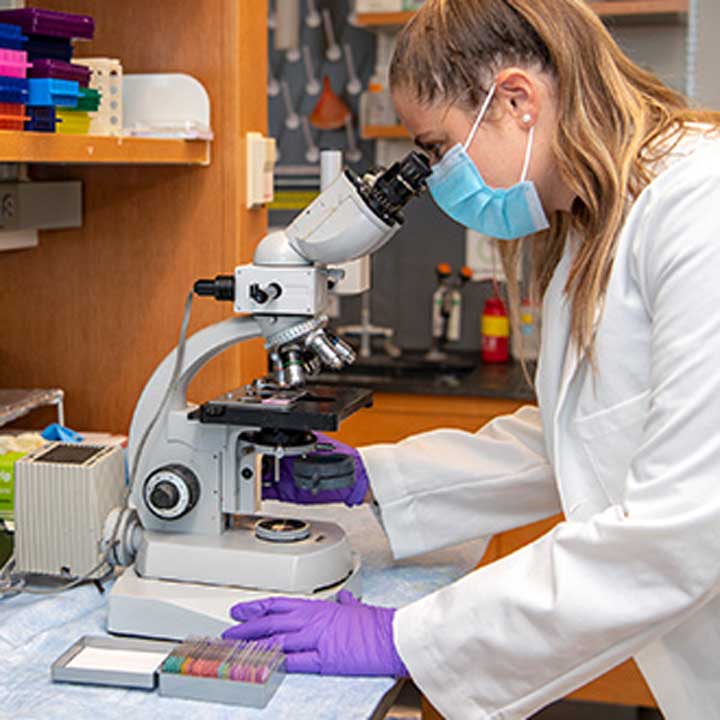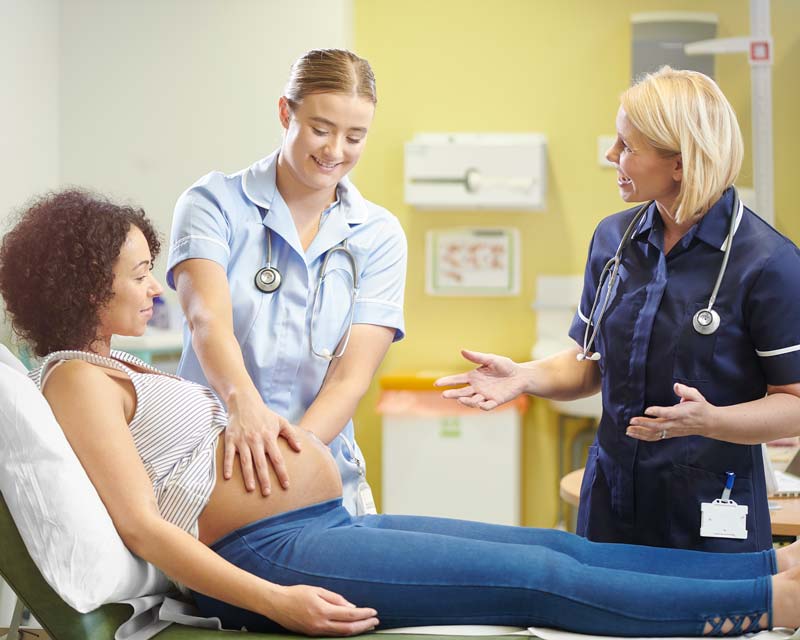 The Maternal Fetal Medicine team at The Ohio State University Wexner Medical Center emphasizes clinical research as an important tool in improving the care provided to expectant mothers and their babies.
The Maternal Fetal Medicine team at The Ohio State University Wexner Medical Center emphasizes clinical research as an important tool in improving the care provided to expectant mothers and their babies.
This commitment will be on full display when we present 22 research studies at the Society for Maternal-Fetal Medicine’s (SMFM) 43rd Annual Pregnancy Meeting in San Francisco Feb. 6-11.
The Pregnancy Meeting is the centerpiece of the society’s work to support maternal fetal medicine practitioners, and the premier event for learning about innovative science in obstetrics and maternal fetal medicine.
Broad range of experts highlights national research
Our accepted abstracts include 16 posters and six oral presentations that highlight research conducted at Ohio State and in collaboration with other groups, including the Maternal-Fetal Medicine Units (MFMU) Network, a long-standing network that leads obstetrical research in the U.S. Four presentations will feature national studies led by Ohio State researchers, and 14 of the selected projects will be presented by trainees or first-time presenters.
“The Division of Maternal Fetal Medicine at The Ohio State University has exceptional clinicians, researchers and educators, and the opportunity to present this many different studies is a testament to the significant expertise and leadership of our team,” says Maged Costantine, MD, division director of Maternal Fetal Medicine. “The fact that so many of the accepted presentations feature work led by trainees emphasizes the strength of our training program, which is really important because it helps us attract top residents and fellows to our program.”
Posters and oral presentations cover a broad spectrum of research topics
- In a session focused on health equality and policy, Jenna Meiman, MD, an obstetrics/gynecology resident, will share findings on the association of neighborhood socioeconomic disadvantage and postpartum readmission; and Kartik Venkatesh, MD, PhD, who’s a lead or senior author on several abstracts, will discuss neighborhood socioeconomic disadvantage and abnormal fetal growth. In addition, Sara Post, MD, an obstetrics/gynecology resident, will present on the association between community-level political affiliation and vaccination in the peripartum period.
- Several of the studies address infectious diseases and pregnancy. Jennifer Grasch, MD, maternal fetal medicine fellow, will present a poster on behalf of the MFMU on factors associated with breastfeeding and offspring outcomes among people with hepatitis C during pregnancy. Mahmoud Abdelwahab, MB/BCH, a maternal fetal medicine fellow, also on behalf of the MFMU, authored a poster on maternal and neonatal biometry during the COVID-19 pandemic.
- Kara Rood, MD, medical director of Ohio State’s Substance Abuse Treatment, Education and Prevention Program (STEPP Clinic) will make two oral presentations. On behalf of MFMU, she’ll provide the results of a randomized trial of individual opioid prescription protocol versus fixed quantity for post-cesarean pain management. In addition, during a session focused on medical complications of pregnancy, she’ll share findings on the effect of maternal body mass index on optimal dosing of aspirin for preeclampsia prevention. Similarly, Heather Frey, MD, associate professor of Obstetrics and Gynecology, is a senior author on two abstracts evaluating morbidities associated with obesity in pregnancy.
- Joe Eid, MD, a maternal fetal medicine fellow, will present on the use of noninvasive cardiac monitoring to individualize the discontinuation of magnesium sulfate in the postpartum period in people with severe preeclampsia; Caroline (Tracy) Bank, MD, a maternal fetal medicine fellow, will present on the association of sodium intake with the development of hypertensive disorders of pregnancy; and Christine Field, MD, a maternal fetal medicine fellow, will discuss the association of community walkability and glycemic control among pregnant individuals with pregestational diabetes.
Other research presentation topics are related to diabetes, obesity, breastfeeding, substance use, hypertensive disorders and obstetric pharmacology.
Ohio State poster presentations:
- M Abdelwahab for MFMU. Maternal and neonatal biometry during COVID-19 pandemic.
- J Grasch for MFMU. Breastfeeding initiation among people with hepatitis C during pregnancy: Associated factors and offspring outcomes.
- S Post, B Fox, C Lynch, M Kiefer, M Costantine, K Rood, M Landon, W Grobman, K Venkatesh. Association between community-level political affiliation and Tdap, influenza, and COVID-19 vaccination in the peripartum period.
- J Eid, M Ma’ayeh, S Post, C Darin, S Rentsch, M Cackovic, K Rood, M Costantine. Use of non-invasive cardiac monitoring to guide discontinuation of postpartum magnesium sulfate in severe preeclampsia.
- A Cheedalla, A Thompson, E Fortman, J Grasch, K Venkatesh, M Landon, H Frey. Maternal body mass index, maneuvers to resolve social dystocia, and neonatal morbidity among pregnant individuals with a shoulder dystocia.
- J Grasch, K Venkatesh, R Silver, G Saade, B Mercer, L Yee, C Scifres, S Parry, H Simhan, J Chung, B McNeil, W Grobman, H Frey. Association of obesity with outcomes of attempted operative vaginal delivery.
- J Grasch, C Cobe, K Benninger, E Cleary, M Phelps, M Costantine, K Rood. Maternal-fetal biodisposition of buprenorphine and its metabolites in opioid dependent pregnant individuals.
- S Post, M Kiefer, M Caplan, J Cowan, P Cackovic, A Jordan, K Rood. Does self-identified race and ethnicity affect rates of child protective services (CPS) referrals following delivery?
- K Venkatesh, S Khan, J Wu, P Catalano, M Landon, D Scholtens, W Lowe, W Grobman. Racial and ethnic differences in the association between pregnancy dysglycemia and cardiometabolic outcomes 10-14 years’ postpartum in the HAPO follow-up study.
- K Venkatesh, P Catalano, J Wu, M Landon, D Scholtens, W Lowe, W Grobman. Association of large-for-gestational-age birth with childhood adiposity at 10 to 14 years in the HAPO follow-up study.
- K Venkatesh, E Buschur, J Wu, C Powe, M Landon, S Gabbe, K Gandhi, W Grobman, N Fareed. Continuous glucose monitoring use among female individuals of reproductive age with type 1 diabetes in the T1D exchange.
- T Bank, J Grasch, J Chung, B Mercer, B McNeil, S Parry, G Saade, A Shanks, R Silver, H Simhan, L Yee, W Grobman, H Frey. The association of sodium intake with the development of hypertensive disorders of pregnancy.
- A Cheedalla, M Abdelwahab, Jamie Cowen, A Stiles, I Mason, K Rood. Hepatitis C virus in pregnant individuals with opioid use disorder and association with preterm birth.
- M Ma’ayeh on behalf of MFMU. Association between influenza vaccination and SARS-CoV-2 infection.
- I Mason, M Abdelwahab, A Stiles, K Venkatesh, J Wu, K Rood. Association between individual versus community-level social vulnerability and neonatal opiate withdrawal syndrome.
- A Stiles, M Abdelwahab, I Mason, OT Hall, J Wu, K Venkatesh, K Rood. Associations between social vulnerability and hepatitis C virus in pregnant individuals with opioid use disorder.
Ohio State oral presentations:
- J Meiman, W Grobman, L Yee, D Haas, B McNeil, J Chung, B Mercer, H Simhan, U Reddy, R Silver, S Parry, G Saade, C Lynch, K Venkatesh. Association of neighborhood socioeconomic disadvantage and postpartum readmission.
- K Venkatesh, L Yee, J Johnson, B McNeil, B Mercer, H Simhan, U Reddy, R Silver, S Parry, G Saade, C Lynch, W Grobman. Neighborhood socioeconomic disadvantage and abnormal fetal growth.
- K Rood, M Ma'ayeh, M Abdelwahab, M Paglione, N Abbott, K Hill, J Guo, K Kim, D Kniss, M Phelps, M Costantine. The effect of maternal body mass index on optimal dosing of aspirin for preeclampsia prevention.
- K Rood on behalf of MFMU. A randomized trial of individualized opioid prescription protocol versus fixed quantity for post-cesarean pain management.
- C Field, C Lynch, N Fareed, J Joseph, J Wu, S Thung, S Gabbe, M Landon, W Grobman, K Venkatesh. Association of community walkability and glycemic control among pregnant individuals with pregestational diabetes.
- K Venkatesh, W Grobman, J Wu, P Catalano, M Landon, D Scholtens, W Lowe, S Khan. Association of large-for-gestational age birth and prediabetes/diabetes 10-14 years’ postpartum in the HAPO follow-up study.
Read more featured stories

 The Maternal Fetal Medicine team at The Ohio State University Wexner Medical Center emphasizes clinical research as an important tool in improving the care provided to expectant mothers and their babies.
The Maternal Fetal Medicine team at The Ohio State University Wexner Medical Center emphasizes clinical research as an important tool in improving the care provided to expectant mothers and their babies.